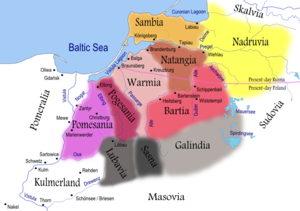Pomesania

Pomesanians and other Prussian clans during the 13th century
|
|
| Total population | |
|---|---|
| Extinct in 17th-18th century | |
| Regions with significant populations | |
| Languages | |
| Old Prussian, later also German | |
| Religion | |
| Prussian mythology (Paganism) | |
| Related ethnic groups | |
| Other Prussians and Balts |
Pomesanians were one of the Prussian clans. They lived in Pomesania (Lithuanian: Pamedė; German: Pomesanien; Polish: Pomezania), a historical region in modern northern Poland, located between the Nogat and Vistula Rivers to the west and the Elbląg River to the east. It is located around the modern towns of Elbląg and Malbork. As the westernmost clan, the Pomesanians were the first of the Prussians to be conquered by the Teutonic Knights, a German military crusading order brought to the Chełmno Land to convert the pagans to Christianity. Due to Germanization and assimilation, Pomesanians became extinct some time in the 17th century.
The territory is said in folk etymology to have been named after Pomeso, a son of Widewuto, legendary chieftain of the Prussians. Georg Gerullis determined that its name was actually derived from the Old Prussian word pomedian, meaning fringe of the forest. The Lithuanian term pamedė, having the same meaning, was introduced by Kazimieras Būga.
The area was inhabited by Baltic people at least since the 9th century and possibly earlier. At the dawn of the 13th century the population is estimated at around 16,000–20,000. The clan, together with their neighbours the Pogesanians, made frequent raids into Masovian lands. In 1225 Duke Konrad I of Masovia asked the Teutonic Knights to protect his territory from such raids. In 1230 the Knights settled in the Chełmno Land and began the Prussian Crusade. In 1231 they crossed Vistula and built Thorn (Toruń). Pomesanian leader Pepin unsuccessfully besieged the city, but soon he was captured and tortured to death. In 1233 the work began in Marienwerder (Kwidzyn), and during the winter the Prussians gathered a large army for a major battle on the Sirgune River, where they suffered a great defeat. During the next three years all of Pomesania was conquered and made part of the Monastic State of the Teutonic Knights. The city of Elbing (Elbląg) was founded in 1237 by the Order near the ancient Prussian trading town of Truso.
...
Wikipedia
